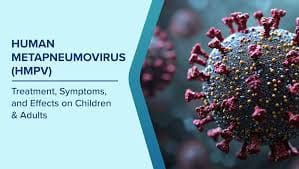Table of Contents
Human metapneumovirus (HMPV) is a common virus that causes cold-like symptoms, including coughing, wheezing, and a sore throat. While most cases are mild, young children, adults over 65, and individuals with weakened immune systems are at higher risk of severe complications.
Symptoms of Human Metapneumovirus
Common symptoms of HMPV include:
- Cough: Persistent and sometimes accompanied by wheezing.
- Fever: Mild to moderate.
- Runny or Stuffy Nose: Typical cold-like symptoms.
- Sore Throat: Often one of the first symptoms.
- Shortness of Breath (Dyspnea): Particularly in severe cases.
- Rash: In rare cases, rash may develop.
Causes and Risk Factors
What Causes Human Metapneumovirus?
HMPV is caused by a virus from the Pneumoviridae family, similar to respiratory syncytial virus (RSV). It spreads via:
- Direct contact: Through sneezing, coughing, or shaking hands.
- Surface transmission: Touching contaminated objects like toys or phones.
Who is at Risk?
Certain groups are more prone to severe HMPV symptoms, such as:
- Children under 5 years old.
- Adults over 65 years old.
- Individuals with weakened immune systems.
- Those with chronic conditions like asthma or COPD.
Diagnosis and Treatment
How is HMPV Diagnosed?
Healthcare providers use symptoms and health history to diagnose HMPV. Nasal or throat swabs may be tested to confirm the virus, particularly in severe cases.
Treatment Options
There is no specific antiviral treatment for HMPV. Management includes:
- Hydration: Drink plenty of fluids.
- Over-the-counter medications: For fever, congestion, or cough.
- Hospital care: For severe cases requiring oxygen therapy or IV fluids.
Prevention Tips
Protect yourself and others from HMPV by:
- Washing hands frequently with soap.
- Avoiding close contact with sick individuals.
- Wearing masks in crowded places during flu season.
- Disinfecting surfaces regularly.

How Long Does HMPV Last?
Most mild HMPV cases resolve within a week. Severe cases may take longer, with lingering symptoms like a cough.
When to Seek Medical Attention
Contact a healthcare provider if:
- Symptoms worsen or don’t improve after a few days.
- High fever persists for more than three days.
Seek emergency care if you experience: - Difficulty breathing.
- Cyanosis (bluish skin, lips, or nails).
- Worsening of pre-existing health conditions.
Summary
Human metapneumovirus (HMPV) is a common respiratory virus that often mimics a cold. While most cases are mild, individuals in high-risk groups should monitor symptoms closely. Consult your healthcare provider for persistent or severe symptoms.


Pingback: Jagdeep Singh: The Highest-Paid Indian-Origin Techie
Pingback: ICMR Detects HMPV Cases in Karnataka: Key Facts and Updates